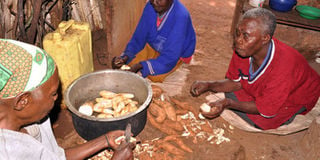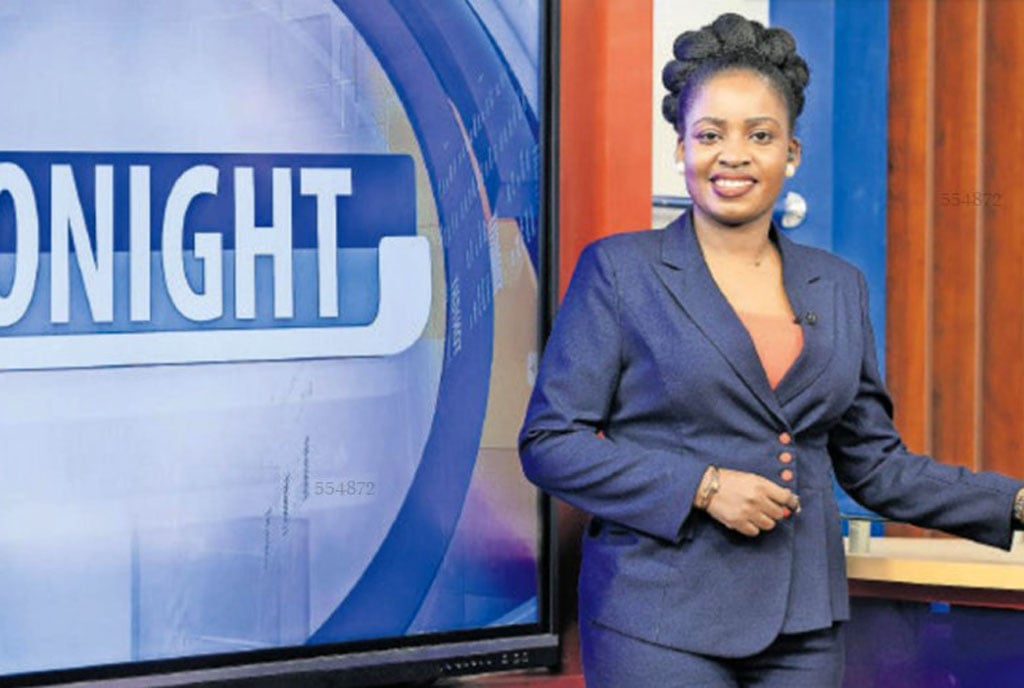Prime
Why should old people fend for themselves?

The elderly at the seniors home Mirembe Maria, in Nakisunga, Mukono District, prepare their meals. Photo by Rachel Mabala
What you need to know:
We are in a country and age where the elderly are not looked at with appreciation for the hard work they have put in to raise their children and build their country. Instead, they are seen as weakest link of the increasingly morally degenerating society which has no respect for senior citizens and are either neglected or live in poverty, while other people take advantage, robbing them of what is left of their sweat
There is simply no way we can be nice about it; old people are not a priority today. They do not create the bulk of the country’s revenues. They are not even the biggest age demographic in the population. They are an aging bunch, frail and easily susceptible to disease and are slowly dying away.
That could be an insensitive outlook. But it is an honest insensitive outlook nevertheless. The truth about it, however, is not that old people have lost their worth, but that Uganda, both its people and its leaders, has opted to treat them as such.
So, while a high premium is levied on citizens in their ages of prime, starting from childhood when they are the promising leaders of tomorrow, to when they mature and act as the critical labour force that puts in the long hours to build the nation, little or no value is placed on citizens after they cross the 60-year mark.
At 60, old people are spilled out of society’s circle of attention the way factories spill out waste material. And yet this is a very dangerous path. Because, although old people may not be as vibrant or even creative, they still hold large stakes in social life, and yes, the economic wellbeing of society as well.
The one word that Chris Kituku Mpweire, the general-secretary for the National Network for Older Persons of Uganda (Nnopu), uses to describe the treatment of old people in Uganda, is “neglect”. It is an evil for which there must be collective blame and not finger-pointing at politicians.
In fact, most of the deprival of attention to old people happens at family level. Mr Kituku links this to a breakdown of the African concept of a family. In the African setting, the very young, the very old, and everybody in-between, plays an important role. Modern life has rendered old people of little significance in family.
Mr Kituku says, it is through the interaction with grandparents, say during evening talks around the fire in the extended family setting, that children learned their oral history, important moral values, and, created a continuity of bonding between the older and newer generations.
Today, however, a westernised system is robbing society of these important linkages. Children wake up very early to go to school, come back late to answer homework questions, and during holidays, spend the time in holiday classes. Resultantly, there is no room for bonding, not only between children and their parents, but with their grandparents as well.
It creates a situation of physical and emotional detachment between the older and younger generations, where older people are kept away in villages and country homes out of touch with their younger relatives, and where the older generations have not been involved in the raising of younger generations.
It would thus be too much to expect children who have not grown seeing the value of their grandparents, turning round and paying old people due attention when they are older.
Old people’s lives which have suffered a drastic change in lifestyles from the action-packed life of a job and all its schedules to a lull humdrum of inactivity, are then denied the human interaction that previously came through grandchildren.
And Mr Kituku says there are adverse effects of this, some of which have already started biting. He points to a continued loss of public morals and general good manners in society as one such. Old people are blessed with a wealth of experiences, which the younger generation would be better for it if they picked and learned from.
Problems facing old people are myriad. While some grandparents are lonely and neglected, others instead suffer the hardships of having to raise their grandchildren whose parents could have died away to disease. Then there is poverty, gut wrenching poverty made worse by the absence of formal employment for people of that age.
There is the case of delayed pensions where an aged person, say leaving in Kabale, is forced to spend their little savings traveling back and forth to Kampala as they chase their pension payments, very often in vain. Many take years before their benefits are paid, and thus, it must have been a case of throwing salt into the wound when it emerged recently that billions of shillings of pensioners’ money was stolen.
There is the case of injustices, and the inability to fight crime. Old people, many of whom are either illiterate or physically handicapped, have been defrauded of properties, especially real estate, by younger relatives.
There is the case of little to no specialised medical care. Frederick Nyanzi, the project manager at The Aged Family Uganda, says while children have specialist doctors and specialist health institutions, there is hardly a geriatric doctor (one who deals with the elderly) on the market. Mr Kituku, himself an aged person, quips that health workers at workers do not act with the same degree of urgency when a sick child is brought in, compared to when with a sick older person.
There has been some progress with government support to the elderly, seen especially through the Social Assistance Grant for Empowerment (SAGE) programme, where Shs25,000 is given to old persons in six districts. But geriatric social workers say there is more that could be done. For instance, interest groups like women, the youth, people with disabilities, even the army, have representation in Parliament. The elderly have none, except if it is a coincidence of age. Mr Kituku, who runs Matunda ya Wazee, an organisation helping aged people into entrepreneurship through bee keeping, says geriatric NGOs get way too little funding from donors as compared to other interest groups.
Dealing with old people has had changes in the world with advanced countries especially, using homes for the elderly to care for old people. Mr Kituku says although Uganda’s society is conservative and is based on strong family ties, times have since changed, and indeed, homes for the elderly may offer better treatment to old people.
Mr Nyanzi’s The Aged Family Uganda, runs an elderly care services project where care is provided to the elderly in their homes, without taking them out to a home. This thus maintains the element of family, and offers an option on how settings like ours can embrace professional care for old people.
The United Nations Population Fund released a report this year stating that by 2050, a fifth of the world’s population will be made of old people. This is buttressed by the improving state of heath care which allows people to live longer. The report noted that old people still have an important role to play in social development. For instance, most of the real estate in the societies is held in the names of old people; and because it is such resources that help build societies, the views of old people become very important.
Perhaps the most sobering reason as to why middle aged people who should start caring or putting in place systems that care for the elderly, is the fact that very soon, they too will be old people, in need of this very care and services. And maybe if as a society we knew that old age is our combined destiny, then the affairs of old people would be a priority to us all.
===========================================================
Mirembe Maria, a home for the elderly citizens
There are three vacancies left at the Mirembe Maria Home for the Elderly in Nakisunga, Mukono District. But the home is not taking on more occupants, because of a shortfall in funding.
The home is run by the Roman Catholic Servites of Mary, depending on contributions from ordinary folk and Christians for support, in such forms as soap, clothes food or even funds.
This is one of the many homes of the elderly in Uganda, a trend that is picking up because increasingly, many old people are finding themselves completely helpless, some without even known living relations. Sister Mary Benet Tauline Nakanwangi, the caretaker, says the five residents at the home have fallen on such hard times.
Sister Nakanwagi, now the only worker at the home, takes on the duties of cooking, bathing, and washing clothes for the residents. This is on top of taking time off to cultivate a mixed cassava-beans-matooke garden for food. The occupants’ ages range from 75 to 85-years-old.
There is no denying this is a nearly insurmountable task for an individual who also has to teach religious studies at a nearby Primary School. The toll is evident on Sister Nakanwagi who has to be nurse, a teacher, a counsellor and even spiritual leader for the members of the home. So much was the toll on her that within a month of working at the home, she had caught typhoid.
Each resident comes with their set of complications. Some believe in witchcraft and want to be allowed to appease the spirits, and yet this is a Christian run home. Some may be alcoholics, drinking away and wasting themselves even when it is detrimental to their lives.
The pain of loneliness is evident on many of the residents, Sister Nakanwagi says. Some, like those who have lost loved ones, say they were bewitched and withdraw to themselves, not seeking company.
Some are however proactive, accepting to take part in preparations for food or even accepting to help till the garden. Otherwise, the residents do not do much more than wake up between 9 to 10 a.m, have breakfast, wait for lunch in the early afternoon, and then, wait for supper later on.
Some of the homes for the elderly include; Elderly home run by the Old Sisters of Gogonya, Elderly home run by The Sisters of Nkokonjeru in Nkononjeru, Mukono, and Mapeera Bakateyamba Home for the Elderly in Nalukolongo, Kampala.




